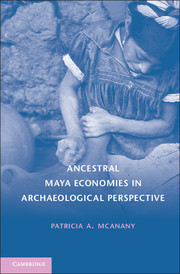Book contents
- Frontmatter
- Dedication
- Contents
- List of Figures
- Preface and Acknowledgments
- 1 The Materiality of Practice in Ancestral Maya Economies
- 2 Situating Maya Societies in Space and Time
- 3 Feeding a Hungry Landscape
- 4 Gendered Labor and Socially Constructed Space
- 5 Ritual Works: Monumental Architecture and Generative Schemes of Power
- 6 Naturalized Authority of the Royal Court
- 7 Social Identity and the Daily Practice of Artisan Production
- 8 Places, Practices, and People of Commerce
- 9 Flowery Speech of Maya Tributary Arrangements
- 10 Skeining the Threads
- References Cited
- Index
1 - The Materiality of Practice in Ancestral Maya Economies
Published online by Cambridge University Press: 05 December 2014
- Frontmatter
- Dedication
- Contents
- List of Figures
- Preface and Acknowledgments
- 1 The Materiality of Practice in Ancestral Maya Economies
- 2 Situating Maya Societies in Space and Time
- 3 Feeding a Hungry Landscape
- 4 Gendered Labor and Socially Constructed Space
- 5 Ritual Works: Monumental Architecture and Generative Schemes of Power
- 6 Naturalized Authority of the Royal Court
- 7 Social Identity and the Daily Practice of Artisan Production
- 8 Places, Practices, and People of Commerce
- 9 Flowery Speech of Maya Tributary Arrangements
- 10 Skeining the Threads
- References Cited
- Index
Summary
Economies are strange beasts; in the idiom of The Market, they are said to perform, to be bullish or bearlike. Although few living in the twenty-first century conceive of the market in true animistic terms, the power, the prevalence, the fundamentality of market capitalism within our society imbue it with a vitality that is conducive to animistic tropes. Economies are foundational: humans cannot live by bread alone, but, without bread (or tortillas), humans would starve. Economies are about more than the manner by which humans go about feeding, clothing, and housing themselves; economies also are fundamentally social entities; there is nothing “natural” about economic practice (although some rational choice economist might disagree). From a perspective that is so abstract as to be practically meaningless, we can assert that all economies are organized around production, exchange, and consumption, but radical differences become readily apparent as one drills down and begins to examine economic practice on a human scale – the ethos and social relations of production, the means and motivations behind the circulation of goods, and the tempo and logic that undergird the consumption and replacement of goods. When one moves around the space–time continuum beyond market capitalism, as we do in this study, the extent to which sectors of this tripartite scheme differ from capitalism becomes so great as to render them easily misinterpreted (as often has been the case in the Maya region).
- Type
- Chapter
- Information
- Publisher: Cambridge University PressPrint publication year: 2010

